My Medical and Orphanage Project in Ghana
Published on Wednesday 19 October 2016My Medical and Orphanage Experience in Ghana
Emily Haines
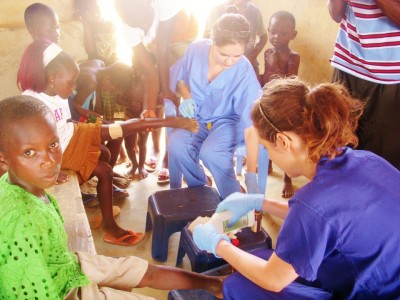 My name is Emily Haines, and I have embarked on two unforgettable experiences in Africa. My life-long ambition is to become a doctor, and watching medical volunteers in Africa on BBC news TV channel one day motivated me to get in touch with Global Medical Projects to find out more. I was instantly hooked on the idea of embarking on an unforgettable lifetime experience in a Third world country! Although my trips took much planning in terms of finances and dates, it was certainly worthwhile. On my gap year prior to university, I took a month long trip for a medical and orphanage project in Ghana. Central Regional hospital in Cape Coast was where I spent the majority of my time, and it really opened up my eyes to the large differences between developing healthcare systems and the developed. In the evenings, I visited a small orphanage in the village of Ansapetu, where I met many children that were grateful for even a friendly face showing up at their door. It doesn’t stop there though! 2 years after reflecting on my time in Ghana, I could not wait to begin another project in another African setting, so I chose Tanzania. I was in Tanzania for 3 weeks, where I did another project, set in Meru District Hospital, and ‘Cradle of Love’ orphanage. People may think the two African projects I did were almost the same experiences, but I would definitely disagree. I came back from both experiences having learnt different practices, cultures and languages!
My name is Emily Haines, and I have embarked on two unforgettable experiences in Africa. My life-long ambition is to become a doctor, and watching medical volunteers in Africa on BBC news TV channel one day motivated me to get in touch with Global Medical Projects to find out more. I was instantly hooked on the idea of embarking on an unforgettable lifetime experience in a Third world country! Although my trips took much planning in terms of finances and dates, it was certainly worthwhile. On my gap year prior to university, I took a month long trip for a medical and orphanage project in Ghana. Central Regional hospital in Cape Coast was where I spent the majority of my time, and it really opened up my eyes to the large differences between developing healthcare systems and the developed. In the evenings, I visited a small orphanage in the village of Ansapetu, where I met many children that were grateful for even a friendly face showing up at their door. It doesn’t stop there though! 2 years after reflecting on my time in Ghana, I could not wait to begin another project in another African setting, so I chose Tanzania. I was in Tanzania for 3 weeks, where I did another project, set in Meru District Hospital, and ‘Cradle of Love’ orphanage. People may think the two African projects I did were almost the same experiences, but I would definitely disagree. I came back from both experiences having learnt different practices, cultures and languages!
You can read about Emily’s medical and orphanage project in Tanzania here.
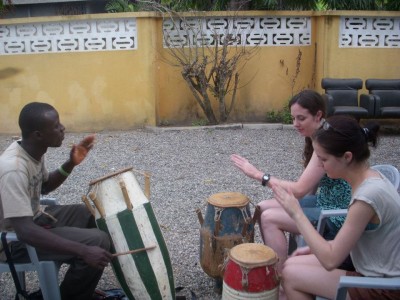 Flying to Ghana was the first time I had ever travelled abroad alone, which was I must admit, quite daunting to begin with. Going into the unknown I really did not know what to expect, but I remember the day I arrived in Ghana like it was yesterday. From meeting Eric, my host, at the airport in Accra, I immediately felt like I was in safe hands. Seeing the bustling capital city of Accra, I instantly had culture shock, but my fascination over-rode my initial worries. The 3 hour journey to Cape coast was an interesting one, seeing the poverty stricken people in mud huts without sufficient clothing on their backs, confirmed what I’d seen in the media was real. However, I also noticed the wealthier side of the area, no longer did I see mud huts but well- constructed houses made of brick. Following this journey to Cape coast town I had arrived at my accommodation in Abura, and Mary, Eric’s wife, and Ruth, the housekeeper, were there to greet me. I was overwhelmed with how friendly and helpful they were and our personalities clicked right away. I also met one of a few volunteers I would be staying with; she helped me settle in by giving me advice, one being a warning of the frequent power-cuts that occur in the house, which I definitely got used to! However, the house had a lot more to offer than I’d expected, there was internet access so I could contact my family easily and a warm shower! Having the weekend to settle in before beginning placement allowed me to take in my surroundings and immerse myself in the different culture. George, the house supervisor and guide took me around Cape Coast educating me about the tourist attractions, including the beaches, Cape Coast castle and local customs and religions, and this really helped me to bond with the locals and shop owners straight away! I was overwhelmed by the friendliness of the locals, greeting strangers in the street was indeed a novelty. I often heard the words ‘Obruni!’ called out to me by the children in the street, I was told it meant I was foreign to them and I would hear it often during my stay. Trying the wonderful African food for the first time was also a new experience; my adjustment to the spice was certainly comical for my host family!
Flying to Ghana was the first time I had ever travelled abroad alone, which was I must admit, quite daunting to begin with. Going into the unknown I really did not know what to expect, but I remember the day I arrived in Ghana like it was yesterday. From meeting Eric, my host, at the airport in Accra, I immediately felt like I was in safe hands. Seeing the bustling capital city of Accra, I instantly had culture shock, but my fascination over-rode my initial worries. The 3 hour journey to Cape coast was an interesting one, seeing the poverty stricken people in mud huts without sufficient clothing on their backs, confirmed what I’d seen in the media was real. However, I also noticed the wealthier side of the area, no longer did I see mud huts but well- constructed houses made of brick. Following this journey to Cape coast town I had arrived at my accommodation in Abura, and Mary, Eric’s wife, and Ruth, the housekeeper, were there to greet me. I was overwhelmed with how friendly and helpful they were and our personalities clicked right away. I also met one of a few volunteers I would be staying with; she helped me settle in by giving me advice, one being a warning of the frequent power-cuts that occur in the house, which I definitely got used to! However, the house had a lot more to offer than I’d expected, there was internet access so I could contact my family easily and a warm shower! Having the weekend to settle in before beginning placement allowed me to take in my surroundings and immerse myself in the different culture. George, the house supervisor and guide took me around Cape Coast educating me about the tourist attractions, including the beaches, Cape Coast castle and local customs and religions, and this really helped me to bond with the locals and shop owners straight away! I was overwhelmed by the friendliness of the locals, greeting strangers in the street was indeed a novelty. I often heard the words ‘Obruni!’ called out to me by the children in the street, I was told it meant I was foreign to them and I would hear it often during my stay. Trying the wonderful African food for the first time was also a new experience; my adjustment to the spice was certainly comical for my host family!
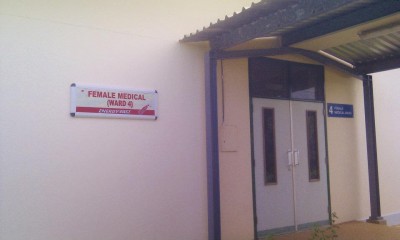 As I began working in the hospital on the Monday, I was greeted by the matron of the hospital who asked me what areas of medicine I was interested in. After this I was allocated to the female medical ward for the first week. I asked doctors them what time they began their ward rounds each day, which was around 10 o’clock, and I soon realised that Ghanaians sense of time was very different to people’s in the UK, as it was different every day, there was no strict schedule. Whilst the doctors had not arrived yet I assisted the nurses with drug administration, dressing changes, and I probed them with questions. I learnt that Malaria was a common condition amongst the women on the ward; Ghanaians taking prevention medicine for it was rare as many could not afford this. Another ailment I observed was particularly prominent in the area was Anaemia, which highlighted to me the diet of many Ghanaians was insufficient in iron-rich food. As a result, I asked doctors if they could improve this by encouraging patients to eat a healthier diet. One thing that interested me was the treatment of Alzhemier’s disease; Ginko Giloba extract was used as a herbal medicine to prevent brain degeneration. Nurses told me of the healthcare system in Ghana, which meant that it isn’t free at the point of care like the NHS. People have to pay for their healthcare insurance, and in a number of cases I saw the distress of patients who could not afford to pay for treatments, they simply got turned away. As doctors arrived on the wards I observed their bedside manner, asked the doctors questions, and despite some language barriers between me and some patients I communicated with many. I was even lucky enough to mix in with the medical students on the wards and once in a class, where I got taught clinical skills and participated in question and answers sessions based on clinic consultations, this was challenging having only completed A levels, but I learnt a lot! The doctors could not have been more helpful and were extremely motivating whilst educating the students. The paediatric ward was a favourite of mine, and following ward rounds I joined the doctors in the clinic where I observed a wide range of various conditions. I noticed that Malnutrition was a serious issue amongst young people, many children had to be put on a treatment called ‘plumby nut’ to increase their nutrition and weight. There was an obvious lack of privacy and confidentiality during patient consultations, although patients had a completely laidback attitude about this which was surprising. In the surgical ward, I soon began to notice the limited resources present in Ghana, as many patients waited a long time to be admitted to surgery, since there was only one operating room in the hospital. One day I was able to directly treat school children’s wounds in a rural village, this was extremely gratifying and the children were even excited to receive a plaster! I felt I gained a broad insight into the healthcare in Africa in Cape Coast hospital, and one day when I qualify as a doctor, going back to treat patients would be even better.
As I began working in the hospital on the Monday, I was greeted by the matron of the hospital who asked me what areas of medicine I was interested in. After this I was allocated to the female medical ward for the first week. I asked doctors them what time they began their ward rounds each day, which was around 10 o’clock, and I soon realised that Ghanaians sense of time was very different to people’s in the UK, as it was different every day, there was no strict schedule. Whilst the doctors had not arrived yet I assisted the nurses with drug administration, dressing changes, and I probed them with questions. I learnt that Malaria was a common condition amongst the women on the ward; Ghanaians taking prevention medicine for it was rare as many could not afford this. Another ailment I observed was particularly prominent in the area was Anaemia, which highlighted to me the diet of many Ghanaians was insufficient in iron-rich food. As a result, I asked doctors if they could improve this by encouraging patients to eat a healthier diet. One thing that interested me was the treatment of Alzhemier’s disease; Ginko Giloba extract was used as a herbal medicine to prevent brain degeneration. Nurses told me of the healthcare system in Ghana, which meant that it isn’t free at the point of care like the NHS. People have to pay for their healthcare insurance, and in a number of cases I saw the distress of patients who could not afford to pay for treatments, they simply got turned away. As doctors arrived on the wards I observed their bedside manner, asked the doctors questions, and despite some language barriers between me and some patients I communicated with many. I was even lucky enough to mix in with the medical students on the wards and once in a class, where I got taught clinical skills and participated in question and answers sessions based on clinic consultations, this was challenging having only completed A levels, but I learnt a lot! The doctors could not have been more helpful and were extremely motivating whilst educating the students. The paediatric ward was a favourite of mine, and following ward rounds I joined the doctors in the clinic where I observed a wide range of various conditions. I noticed that Malnutrition was a serious issue amongst young people, many children had to be put on a treatment called ‘plumby nut’ to increase their nutrition and weight. There was an obvious lack of privacy and confidentiality during patient consultations, although patients had a completely laidback attitude about this which was surprising. In the surgical ward, I soon began to notice the limited resources present in Ghana, as many patients waited a long time to be admitted to surgery, since there was only one operating room in the hospital. One day I was able to directly treat school children’s wounds in a rural village, this was extremely gratifying and the children were even excited to receive a plaster! I felt I gained a broad insight into the healthcare in Africa in Cape Coast hospital, and one day when I qualify as a doctor, going back to treat patients would be even better.
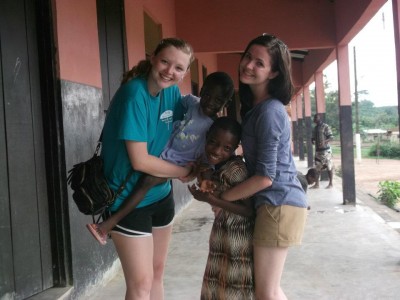 Every day after 6 hours at the hospital, I would retreat home for a quick lunch break (watermelon!) and head off to Ansapetu, where the orphanage was located. This would involve getting a taxi straight from Abura which took around 15 minutes but was very cheap! The children were aged from around 2 to 18 years, which allowed me to interact with differing abilities and interests. James was the founder of the orphanage, who my financial contributions were directly going to. It was satisfying to know that the orphanage was receiving some financial help, as it was very basic, with an obvious air of limited resources. Helena was the other coordinator and she and James were extremely welcoming upon my arrival each day. I would create games with the children after school, such as ‘hide and seek’ with the girls, football with the boys, and I frequently helped the children with homework given to them from school. It was interesting to find out the various future aspirations of the children, and it was refreshing to see they had great ambitions despite being in a situation with money difficulties. I would often help Helena set out dinner for the children, this included fish and banku, this was an interesting food with a white, gooey consistency, which I tried and definitely approved of! Table manners were very strict, as eating only with your right hand and not with the left was the accepted etiquette. Praying before food was a regular occurrence, and I really enjoyed taking part in the children’s respect for god. I helped the children to wash the dishes each day following dinner, and another great opportunity to bond with them was knocking down oranges from the trees in the garden! Learning the children’s names was at first a challenge, but getting to know each child individually it became second nature. Going back to the orphanage to see the children would most definitely be something I am thinking about.
Every day after 6 hours at the hospital, I would retreat home for a quick lunch break (watermelon!) and head off to Ansapetu, where the orphanage was located. This would involve getting a taxi straight from Abura which took around 15 minutes but was very cheap! The children were aged from around 2 to 18 years, which allowed me to interact with differing abilities and interests. James was the founder of the orphanage, who my financial contributions were directly going to. It was satisfying to know that the orphanage was receiving some financial help, as it was very basic, with an obvious air of limited resources. Helena was the other coordinator and she and James were extremely welcoming upon my arrival each day. I would create games with the children after school, such as ‘hide and seek’ with the girls, football with the boys, and I frequently helped the children with homework given to them from school. It was interesting to find out the various future aspirations of the children, and it was refreshing to see they had great ambitions despite being in a situation with money difficulties. I would often help Helena set out dinner for the children, this included fish and banku, this was an interesting food with a white, gooey consistency, which I tried and definitely approved of! Table manners were very strict, as eating only with your right hand and not with the left was the accepted etiquette. Praying before food was a regular occurrence, and I really enjoyed taking part in the children’s respect for god. I helped the children to wash the dishes each day following dinner, and another great opportunity to bond with them was knocking down oranges from the trees in the garden! Learning the children’s names was at first a challenge, but getting to know each child individually it became second nature. Going back to the orphanage to see the children would most definitely be something I am thinking about.
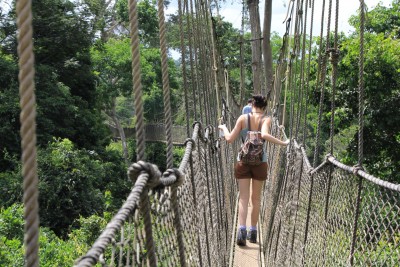 My time in Ghana did not only involve working hard, I also visited many tourist attractions on the weekends and relaxed in local volunteer hotspots in the evenings. There were about 5 of us volunteers coming and going at different time points, but we all managed to spend time with each-other outside of our busy schedules. Going out and meeting new people was a regular Friday night event, Oasis bar was always a great place for ‘westerners’ and the locals to mix, I met many people from Canada, Australia, and other European countries! Going out for food was always a way us volunteers treated ourselves, and some of us missed the odd plate of western food; ‘The castle’ restaurant was a personal favourite of mine! On weekends, I would always think of buying some souvenirs from the local markets. I came back with wooden masks, printed bags and jewellery. One weekend we visited Kakum national park, this involved walking through the forest with a tour guide and over an arial walkway over the canopy of the trees, which I would recommend if you want to conquer a fear of heights! Hans cottage was another place I visited, this was a hotel that overlooked a small lake with crocodiles here, me and the other volunteers had the chance to watch them being fed, and I even had a photo sitting with one! I visited a couple of beach resorts to indulge and swim in the sea; Coconut Grove and Anomabo beach resorts had wonderful staff service and although food prices were higher than what you would get in central cape coast, they were still pretty cheap! One of my favourite attractions was Elimina Castle, where I learnt a bit of African history and the slave trade. Learning the bongo drums each week was an exciting new activity, yet it was harder than it looked! I also went along with Mary to a Christian church service on a Sunday, people’s energetic attitudes and singing during church was inspirational. I will never forget the experience of going solo to Ghana, it was not what I expected but even better, I most definitely recommend it!
My time in Ghana did not only involve working hard, I also visited many tourist attractions on the weekends and relaxed in local volunteer hotspots in the evenings. There were about 5 of us volunteers coming and going at different time points, but we all managed to spend time with each-other outside of our busy schedules. Going out and meeting new people was a regular Friday night event, Oasis bar was always a great place for ‘westerners’ and the locals to mix, I met many people from Canada, Australia, and other European countries! Going out for food was always a way us volunteers treated ourselves, and some of us missed the odd plate of western food; ‘The castle’ restaurant was a personal favourite of mine! On weekends, I would always think of buying some souvenirs from the local markets. I came back with wooden masks, printed bags and jewellery. One weekend we visited Kakum national park, this involved walking through the forest with a tour guide and over an arial walkway over the canopy of the trees, which I would recommend if you want to conquer a fear of heights! Hans cottage was another place I visited, this was a hotel that overlooked a small lake with crocodiles here, me and the other volunteers had the chance to watch them being fed, and I even had a photo sitting with one! I visited a couple of beach resorts to indulge and swim in the sea; Coconut Grove and Anomabo beach resorts had wonderful staff service and although food prices were higher than what you would get in central cape coast, they were still pretty cheap! One of my favourite attractions was Elimina Castle, where I learnt a bit of African history and the slave trade. Learning the bongo drums each week was an exciting new activity, yet it was harder than it looked! I also went along with Mary to a Christian church service on a Sunday, people’s energetic attitudes and singing during church was inspirational. I will never forget the experience of going solo to Ghana, it was not what I expected but even better, I most definitely recommend it!
Many people combine time at the hospital with time at the orphanage and this combination often works well. Combined placements are only £100 – $160 – €120 extra to cover the additional donation to the orphanage.
To follow in Emily’s footsteps and join the pre-university medical project in Ghana.
You can also read more about our orphanage placements in Ghana.
